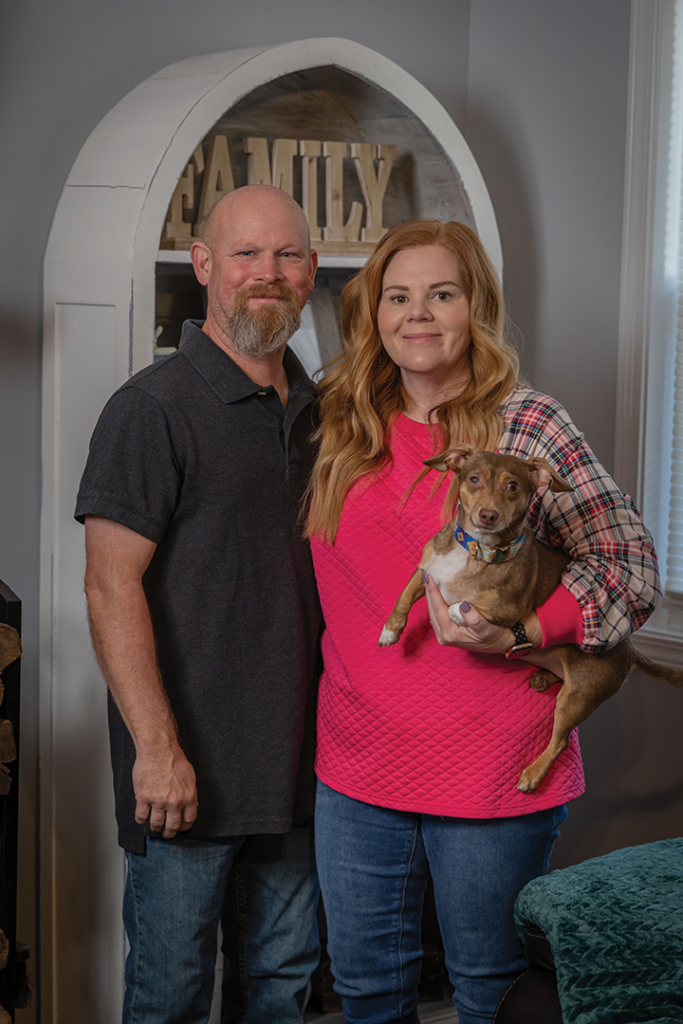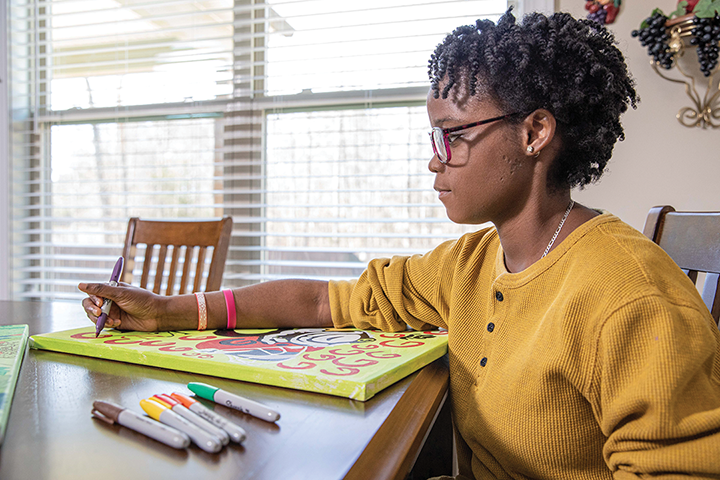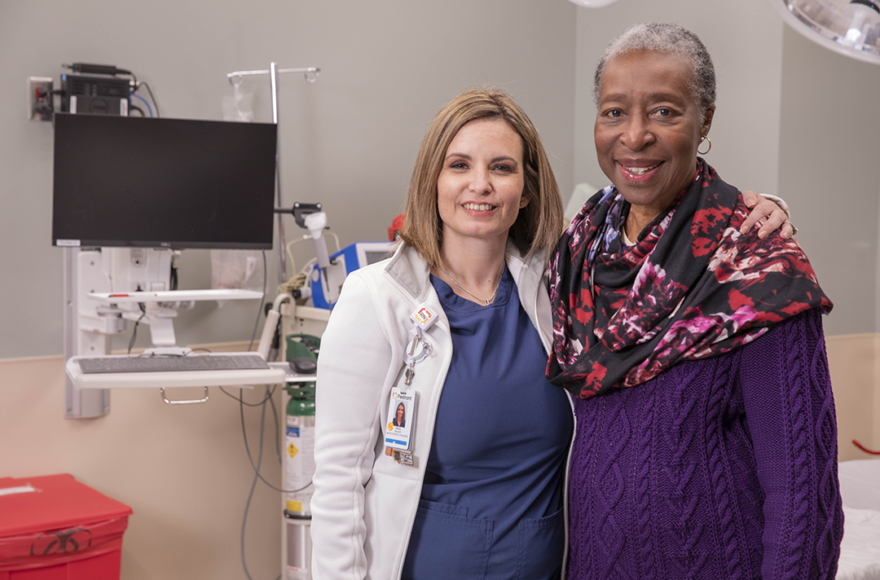An unwelcome visitor appeared to Angela Whitley with numbness and tingling when she was only 20 years old. More than two decades later, she advocates for those struggling with multiple sclerosis and other chronic illnesses, offering hope to those being confronted by similar diagnoses.
Spring mornings can be beautiful in Newton County, often bringing sparkling sunshine, warm temperatures and a chorus of happily chirping birds. However, for Angela Whitley, the dawn of each new day is tinged with struggles.
“Mornings are bad for me,” she said. “My balance is off and it can take 10 to 15 minutes to gain control and try to get going, but I make myself get up and do stuff. If I listened to my body, I wouldn’t get out of bed.”

Whitley was a young mother to baby daughter Elizabeth when she experienced her first signs of multiple sclerosis. According to the National Multiple Sclerosis Society, MS is “an unpredictable disease of the central nervous system that disrupts the flow of information within the brain and between the brain and body.” It impacts the central nervous system, including the brain, optic nerves and spinal cord. No one knows the exact cause of MS, but various known triggers cause inflammation that damages myelin—the protective covering on nerve fibers that extend from the CNS to every part of the body. The damage interrupts communication to and from the brain.
Because the central nervous system controls everything we do, the impact of MS can be unpredictable and different for each person who suffers from the disease. Two hallmark symptoms—tingling and numbness—were Whitley’s earliest signs.
“If I listened to my body, I wouldn’t get out of bed.”
Angela Whitley
“When it started,” she said, “I had numbness and tingling in my hands and feet, fatigue and terrible headaches.”
Other common problems include mood changes, brain fog, memory loss, widespread pain and debilitating exhaustion. Blindness and paralysis are also possible. Not only are the symptoms of MS varied, but they may be temporary, long-lasting or permanent. Often, pregnancy brings a welcome season of remission, as it did for Whitley when she was pregnant with her second child, son Dylan. Carpal tunnel pain was the only symptom she experienced during that time.
It has since become impossible to know what each day will bring. Unpredictability is the rule when living with MS. “You never know what you’re going to wake up to,” Whitley said. “Literally, you could wake up unable to move your legs or arms. You never know. There can be a lot of fear in that.” One of Whitley’s more unusual symptoms is facial paralysis, but it only occurs on the right side of her face. In another instance, she lost the ability to write with her dominant left hand and had to teach herself to write with her right. Chronic fatigue and bouts of depression are ongoing challenges for Whitley as she lives with MS. When her symptoms peak, sometimes a strong round of steroids can bring the condition under control.

“Steroids work because MS produces a lot of inflammation; it attacks the immune system. Steroids reduce the inflammation,” she said, “but sometimes you’re left with permanent damage after a relapse.”
MS has left Whitley with irreversible lesions on her spinal cord and brain. She is still able to work at her job as a special education paraprofessional at Flint Hill Elementary School, but a recent migraine made it impossible for her to go in that day. “I just had to take my rescue medication and stay in bed,” she said. Whitley firmly believes that staying active—even when she does not feel like doing so—plays a significant role in staying ahead of MS.
“I think I’ve done well so far because I stay busy,” she said. “I’ve heard other people say it’s important to exercise because if you don’t, your muscles will weaken.”
Her husband, Gregg, works as a contractor, and she often helps him with odd jobs in the evenings. His skills have proven to be a blessing at home, where he has been able to build modifications to improve accessibility for his better half.
“Big stairs are a challenge,” she said. “At this point, I don’t need mobility aids, even though steps are hard. There have been times I’ve almost fallen, but I’ve been able to catch myself.”
Whitley remembers when she was first diagnosed with MS and visited the Shepherd’s Center, a neurorehabilitation center in Atlanta. “I was 22 the first time I went there,” she said. “I was so afraid, seeing all those people in wheelchairs and thinking I was looking at my future. I’m so grateful I’m still able to get around.” Whitley has been on various medications through the years but found that some drugs for MS result in troublesome side effects. For example, one exacerbated her feelings of depression.
“I started having more negative thoughts when I took it,” she said. “I’m not taking anything now.”
In addition to the love of her family, Whitley turns to her four dogs for support.
“We have a boxer, two chiweenies and a husky/pit mix,” she said. “My dogs are like therapy for me; they bring a lot of joy to my life. I’ve always loved animals.”
Whitley also credits her faith for providing the strength and positivity she needs to deal with her chronic illness. When she gets down, she says that seeking God in those moments reminds her to be grateful for what she has. “I focus on the positive things around me, like sunrises and sunsets,” she said. “Figure out what the positives are in your life and focus on those.” Whitley hopes such advice can help others newly diagnosed with MS. She also stresses the importance of finding a good neurologist, exploring new medication options and joining a support group.
“I follow several MS communities on Facebook,” she said. “There is so much to share with one another, and they may know things you don’t know yet. Everybody needs someone to lean on.”
One difficulty of living with MS is that its challenges can be invisible to others.
“A lot of people see you and think you’re a normal person who isn’t struggling with anything,” she said. “Nobody really understands or knows how to deal with it. Then some judge you for having a handicapped tag and not looking handicapped. I wish people would stop judging what they don’t know, just going by the visuals. We need to embrace and love each other instead.”
Click here to read more stories by Kari Apted.




